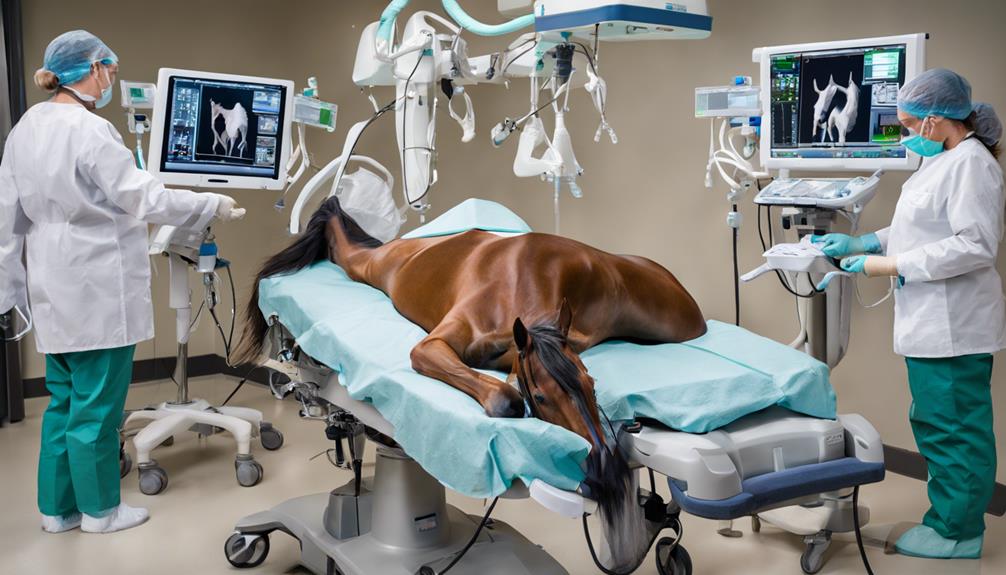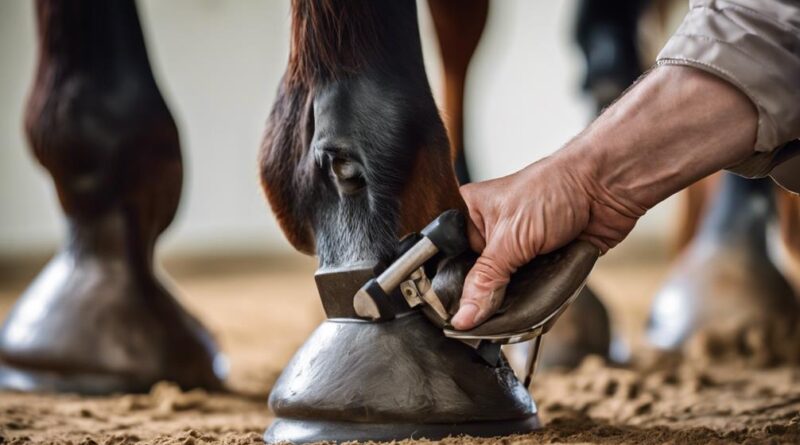Why Pursue Training in Equine Veterinary Medicine?
Did you know that the American Association of Equine Practitioners reported a 25% increase in the number of equine veterinary visits over the past decade?
With such a rise in demand for specialized care, pursuing training in equine veterinary medicine can offer you a unique opportunity to make a significant impact in the field.
Whether you are drawn to the intricacies of equine anatomy, the challenges of treating large animals, or the satisfaction of helping these majestic creatures, exploring the world of equine veterinary medicine could be a rewarding path for you.
Importance of Equine Veterinary Training
Understanding the critical role of equine veterinary training is essential for ensuring the health and well-being of horses under your care. Equine wellness and preventative care are foundational aspects of equine veterinary training. By learning about proper nutrition, vaccination protocols, parasite control, and regular health check-ups, you can proactively safeguard the overall well-being of horses. Preventative care not only helps in maintaining the horses' health but also prevents the onset of serious illnesses, reducing the need for extensive treatments in the future.
Equine sports medicine and performance optimization are also key components of equine veterinary training. Through specialized training, you can learn how to assess and manage injuries specific to athletic horses, implement rehabilitation programs, and utilize cutting-edge techniques to enhance performance. Understanding the biomechanics of movement, proper conditioning programs, and the importance of rest in preventing overuse injuries are vital for ensuring that horses perform at their best while minimizing the risk of harm.
Career Opportunities in Equine Medicine
Exploring the diverse career opportunities available in equine medicine can provide valuable insights into the range of specialized roles within the field. When considering a career in equine medicine, it's essential to understand the job prospects and industry demand to make informed decisions about your future.
Here are some key career opportunities in equine medicine:
- Equine Veterinarian: As an equine veterinarian, you'll diagnose and treat illnesses and injuries in horses. Job prospects for equine veterinarians are promising due to the constant need for healthcare services in the equestrian industry.
- Equine Surgeon: Equine surgeons specialize in performing surgeries on horses. With advancements in veterinary medicine, the demand for skilled equine surgeons is increasing, offering excellent career opportunities in this field.
- Equine Rehabilitation Specialist: Equine rehabilitation specialists focus on helping horses recover from injuries through tailored therapy programs. The industry demand for rehabilitation specialists is growing as more owners seek comprehensive care for their horses.
- Equine Reproduction Specialist: These specialists work with horse breeding programs to ensure successful mating and pregnancy outcomes. Job prospects in equine reproduction are stable, with opportunities in breeding farms, veterinary clinics, and research institutions.
Specialized Courses for Equine Veterinarians
Consider enrolling in specialized courses to enhance your skills as an equine veterinarian. Equine dentistry and lameness evaluation are crucial areas where specialized training can make a significant difference in your practice.
Equine dentistry courses will deepen your understanding of the unique dental anatomy and oral health issues in horses. You'll learn how to perform routine dental exams, float teeth, and address common dental problems such as sharp points and hooks. By mastering equine dentistry, you can ensure the overall health and comfort of your equine patients.
Lameness evaluation courses will sharpen your ability to diagnose and treat musculoskeletal issues in horses. You'll gain expertise in conducting thorough lameness exams, interpreting diagnostic imaging results, and formulating effective treatment plans. With advanced skills in lameness evaluation, you can help improve the performance and well-being of sport horses and pleasure horses alike.
Hands-On Experience in Equine Care
To excel in equine veterinary medicine, gaining hands-on experience in equine care is essential for honing your skills and expertise. Here's why hands-on experience is crucial:
- Equine Handling Techniques: Working directly with horses allows you to develop essential equine handling skills. Learning how to approach, lead, restrain, and interact with horses effectively is fundamental in providing quality care. Through hands-on experience, you can refine your techniques and understand how different horses may require varying approaches.
- Equine Health Assessments: Conducting thorough health assessments on horses is a key aspect of equine veterinary care. Hands-on practice enables you to learn how to perform physical examinations, assess vital signs, identify signs of illness or injury, and recognize common health issues in horses. By actively participating in health assessments, you can enhance your diagnostic abilities and become proficient in detecting potential health problems early on.
- Diagnostic Procedures: Hands-on experience allows you to become familiar with various diagnostic procedures used in equine medicine, such as taking blood samples, performing ultrasounds, or conducting x-rays. Practicing these procedures under supervision helps you develop the necessary skills and confidence to accurately diagnose and treat equine patients.
- Treatment Administration: Through hands-on training, you can learn how to administer treatments, medications, and therapies to horses safely and effectively. Understanding proper dosage, injection techniques, and treatment protocols is crucial for delivering optimal care to equine patients.
Research Advancements in Equine Health
Staying updated on the latest research advancements in equine health is crucial for enhancing your knowledge and skills in equine veterinary medicine. Keeping abreast of developments in equine nutrition and genetics can significantly impact your practice.
Equine nutrition research focuses on understanding the dietary needs of horses to optimize their health and performance. New studies continually uncover the importance of specific nutrients, feeding strategies, and dietary supplements in preventing diseases and promoting overall well-being. By staying informed about these advancements, you can provide tailored nutrition plans that meet each horse's unique requirements.
On the other hand, research in equine genetics delves into the hereditary factors that influence various traits in horses, such as coat color, susceptibility to diseases, and athletic abilities. Understanding the genetic makeup of different horse breeds can help you make informed breeding decisions, predict potential health issues, and implement personalized treatment plans based on genetic predispositions.
Networking in Equine Veterinary Community
Keeping up with the latest research advancements in equine health not only enhances your knowledge and skills but also opens doors to valuable networking opportunities within the equine veterinary community. Networking within this community is crucial for professional growth and staying abreast of industry trends.
Here are some ways you can expand your network:
- Community Events: Attending equine industry conferences, workshops, and seminars provides excellent opportunities to connect with fellow equine veterinarians, researchers, and industry professionals. These events offer a platform to exchange ideas, discuss emerging trends, and forge valuable professional relationships.
- Online Forums: Engaging in online forums dedicated to equine health allows you to interact with a diverse group of individuals passionate about equine veterinary medicine. These forums provide a virtual space to seek advice, share experiences, and learn from the collective knowledge of the community.
- Equine Industry Gatherings: Participating in gatherings specific to the equine industry, such as horse shows, races, or equestrian events, can help you network with horse owners, trainers, and other stakeholders. These interactions can lead to potential collaborations and referrals in the future.
- Continuing Education Programs: Enrolling in specialized equine veterinary courses or workshops not only enhances your skills but also connects you with instructors and peers who share your passion for equine health. These educational settings foster networking opportunities that can benefit your career in the long run.
Equine Medicine Residency Programs

Engage with equine medicine residency programs to deepen your expertise and advance your career in veterinary medicine. These programs offer invaluable hands-on experience through clinical rotations, allowing you to work directly with equine patients under the guidance of experienced professionals. By participating in these rotations, you'll gain practical skills, enhance your diagnostic abilities, and develop a deeper understanding of equine health and wellness.
Moreover, equine medicine residency programs provide excellent mentorship opportunities and career guidance. Through one-on-one interactions with seasoned equine veterinarians, you can receive personalized feedback, advice, and support as you navigate your professional development. These mentors can offer insights into complex cases, share their wealth of knowledge, and help you build a strong foundation for a successful career in equine veterinary medicine.
Continuing Education for Equine Vets
To stay current in the field of equine veterinary medicine, it's essential for practitioners to actively pursue continuing education opportunities. Continuous learning allows you to enhance your skills, stay updated on the latest advancements, and provide the best possible care for your equine patients. Here are some effective ways to engage in continuing education:
- Attend Conferences and Workshops: Participating in equine veterinary conferences and hands-on workshops can provide valuable insights into new treatment methods, technologies, and best practices in the field.
- Online Resources: Utilize online platforms offering webinars, courses, and articles specifically tailored to equine veterinary medicine. These resources can be convenient for learning at your own pace and accessing information from anywhere.
- Case Studies: Reviewing and analyzing real-life equine medical cases can help you improve your diagnostic skills, treatment strategies, and decision-making processes. Engaging with a variety of cases can broaden your understanding of different conditions and their management.
- Collaborate with Peers: Interacting with other equine veterinarians, specialists, and researchers allows you to exchange knowledge, discuss challenging cases, and explore new perspectives in the field. Building a professional network can also open doors to collaborative research opportunities and mentorship.
Frequently Asked Questions
What Are the Common Challenges Faced by Equine Veterinarians in Their Day-To-Day Practice?
In your day-to-day practice, equine veterinarians face various challenges. Emergency protocols are crucial when handling urgent cases. Clear client communication is essential to ensure understanding and compliance.
Diagnostic challenges may arise due to the complexity of equine conditions. Treatment options can be limited by factors like horse size and physiology. Overcoming these obstacles requires quick thinking, strong communication skills, and a deep understanding of equine medicine.
How Does the Equine Veterinary Field Differ From Other Veterinary Specialties?
In the equine veterinary field, you'll find unique challenges due to the specialized nature of working with horses. Equine behavior and nutrition play significant roles in diagnosis and treatment. Understanding these aspects sets this specialty apart from others in veterinary medicine.
What Are the Potential Risks and Safety Concerns Involved in Working With Horses as a Veterinarian?
When working with horses as a veterinarian, potential hazards like kicks, bites, and being stepped on can pose risks. To ensure safety, always maintain awareness of your surroundings, approach horses calmly, and use proper restraint techniques.
Safety precautions such as wearing appropriate protective gear, having a buddy system in place, and receiving proper training on equine behavior are essential for minimizing risks and ensuring a safe work environment in equine veterinary medicine.
How Do Equine Veterinarians Stay Up-To-Date With the Latest Advancements in Equine Medicine?
To stay current in equine medicine, you rely on continuing education, attend conferences, use online resources, collaborate with peers, and read research publications. These methods ensure you're up-to-date on the latest advancements and best practices in the field.
What Are the Emotional Demands of Working With Horses and Their Owners in a Veterinary Setting?
Managing emotions in equine veterinary medicine involves navigating the highs and lows of caring for horses and their owners. Building strong client relationships is key, as you must empathize with owners' concerns while providing professional care.
It's essential to maintain a balance, staying compassionate yet objective to make sound medical decisions. Being attuned to both the emotional needs of clients and the welfare of the animals is crucial in this field.
Conclusion
In conclusion, pursuing training in equine veterinary medicine is a rewarding and fulfilling career choice.
With specialized courses, hands-on experience, and opportunities for research advancements, you can make a real difference in the health and well-being of horses.
Networking within the equine veterinary community and participating in residency programs will further enhance your skills and knowledge.
Continued education will ensure you stay up-to-date with the latest advancements in equine medicine.
Don't hesitate to pursue your passion for caring for horses!
